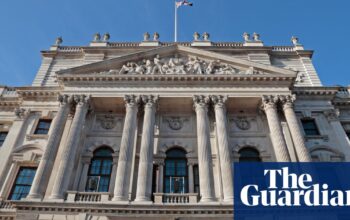
In 2023, a summary of Rishi Sunak’s tax affairs revealed that he paid over £500,000 in taxes after earning a profit of £1.8 million from his investment in a US fund.
The document released by the prime minister on Friday reveals that he paid a tax bill of £508,308 for the financial year 2022-23, based on his total earnings and gains of £2.23m.
This indicates that he was taxed at a rate of 23% in the UK, which is significantly lower than the highest rate of 45%, as a portion of his income was already taxed in the US and the capital gains tax rate is 20%.
Sunak has effectively increased income taxes by freezing tax thresholds and temporarily raising national insurance. However, the rates for capital gains have remained the same while he has served as both chancellor and prime minister.
The TUC posted on Twitter following the announcement: “It’s quite puzzling why Rishi Sunak increased income tax but not capital gains tax.”
His £139,477 salary as prime minister represents just 7% of his total income that year. In addition to the £1.8m gain, he received a £276,218 dividend, and £17,189 of interest on savings and an investment fund in the US.
The tax filing will cause concerns regarding Sunak’s choice to primarily hold his wealth in the US instead of the UK.
Based on the overview given by Sunak’s financial advisors, these investments were managed through a “blind management arrangement,” which resulted in him not receiving the profits as earnings but still being obligated to pay taxes on them.
The chancellor, Jeremy Hunt, released his tax report simultaneously, which revealed that he paid £117,418 in taxes for an income of £208,547 and a capital gain of £208,058.
Hunt earned a total of £63,367, with £27,370 from a rental property and £35,997 from dividends.
In 2023, Sunak released his tax records, which revealed that he had earned approximately £5 million in the last three years primarily from his investment fund in the US.
The prime minister has faced scrutiny over his personal wealth and connections to the US. Sunak was previously a banker at Goldman Sachs and a hedge fund manager, and his marriage to Akshata Murty, daughter of Infosys’ billionaire founder Narayana, has linked him to one of India’s wealthiest families.
In April 2022, Sunak faced criticism for holding a US green card during his time in office, which classified him as a “permanent US resident” for tax purposes for 19 months as chancellor and six years as an MP. Murty also faced criticism for being a non-dom, but she later promised to pay taxes on all income worldwide in the future.
The prime minister and his family possess various real estate assets, such as their residence in the Richmond district of North Yorkshire. This property is a Grade II-listed manor with a personal lake and a recently installed heated pool. However, the pool’s energy usage is substantial, leading Sunak to cover the cost of upgrading the nearby electricity grid.
According to Robert Palmer, the executive director of Tax Justice UK, it is surprising to discover that the prime minister has a significantly lower tax rate despite earning millions. This issue highlights the flaws in our current tax system. Currently, individuals who primarily generate income from their wealth, such as the prime minister, are subject to a lower tax rate compared to those who earn a living through traditional employment. It is necessary to address this disparity and ensure that income from wealth is taxed at an equal rate to income from work.
Source: theguardian.com



